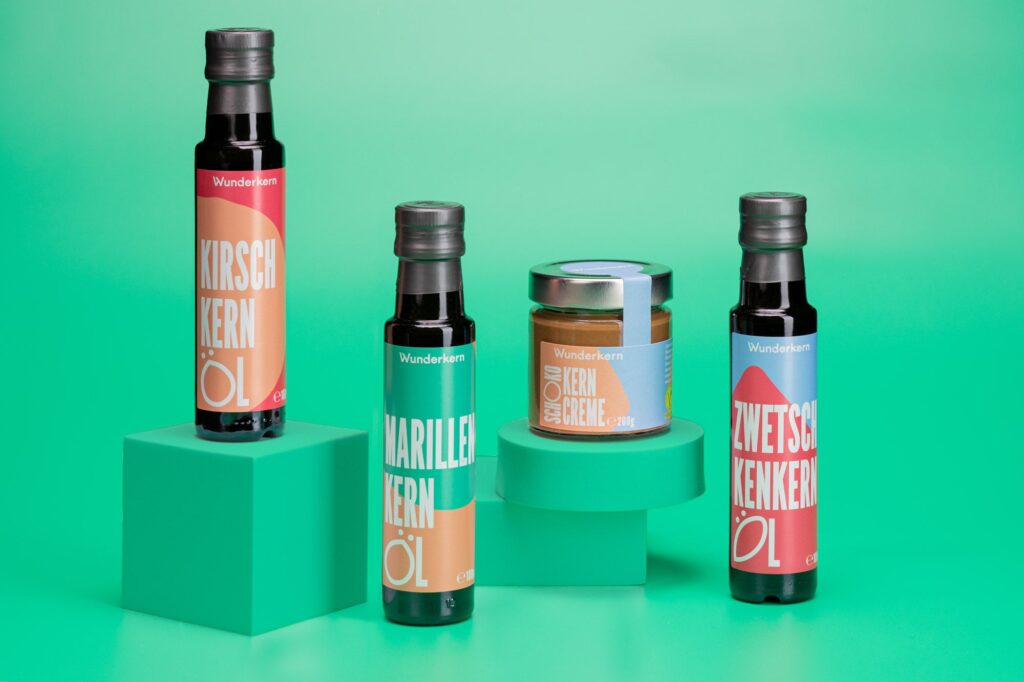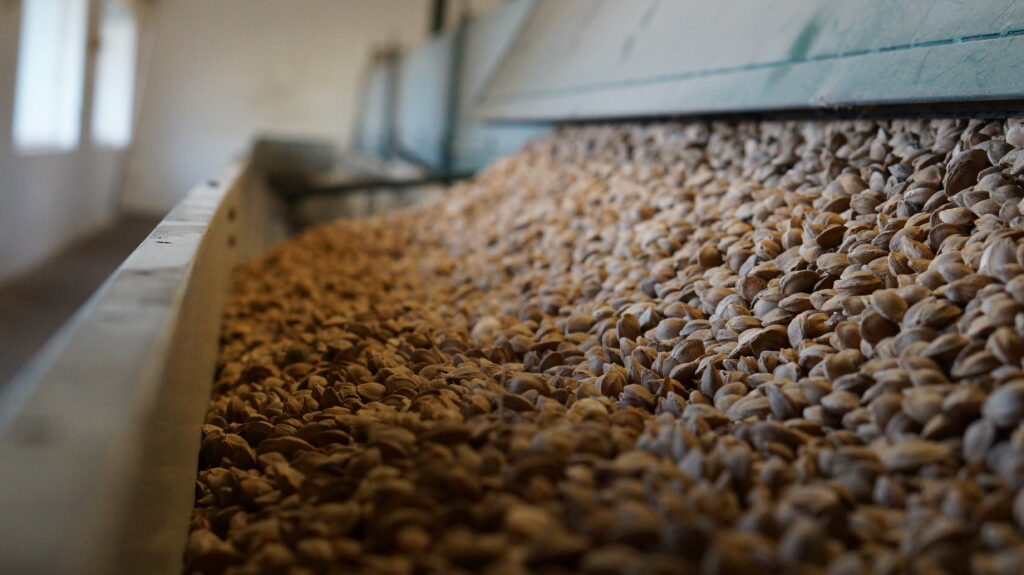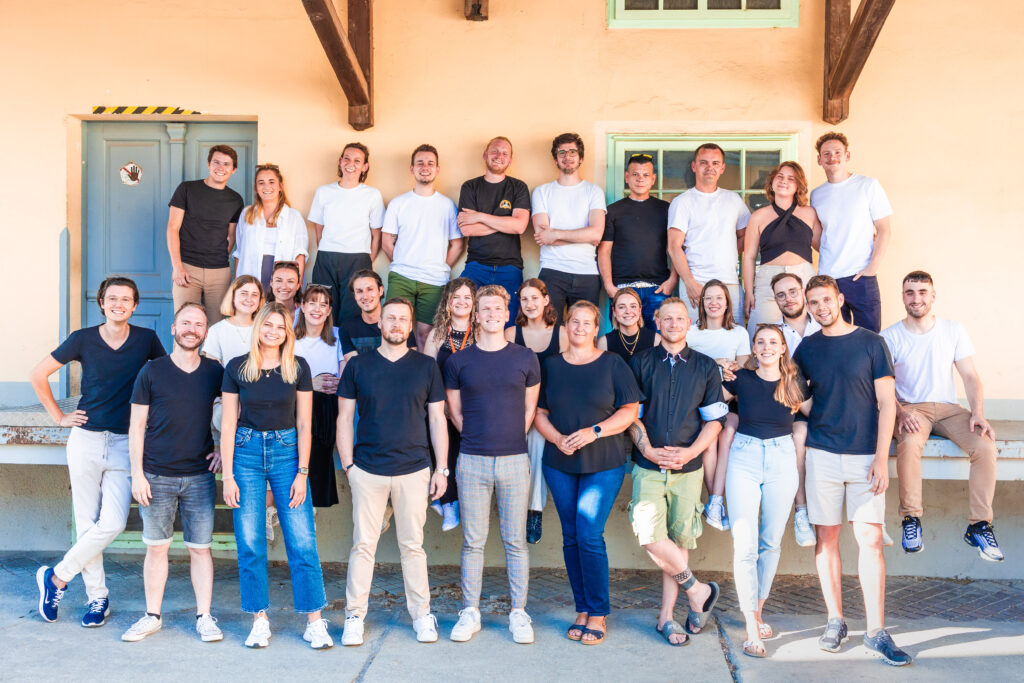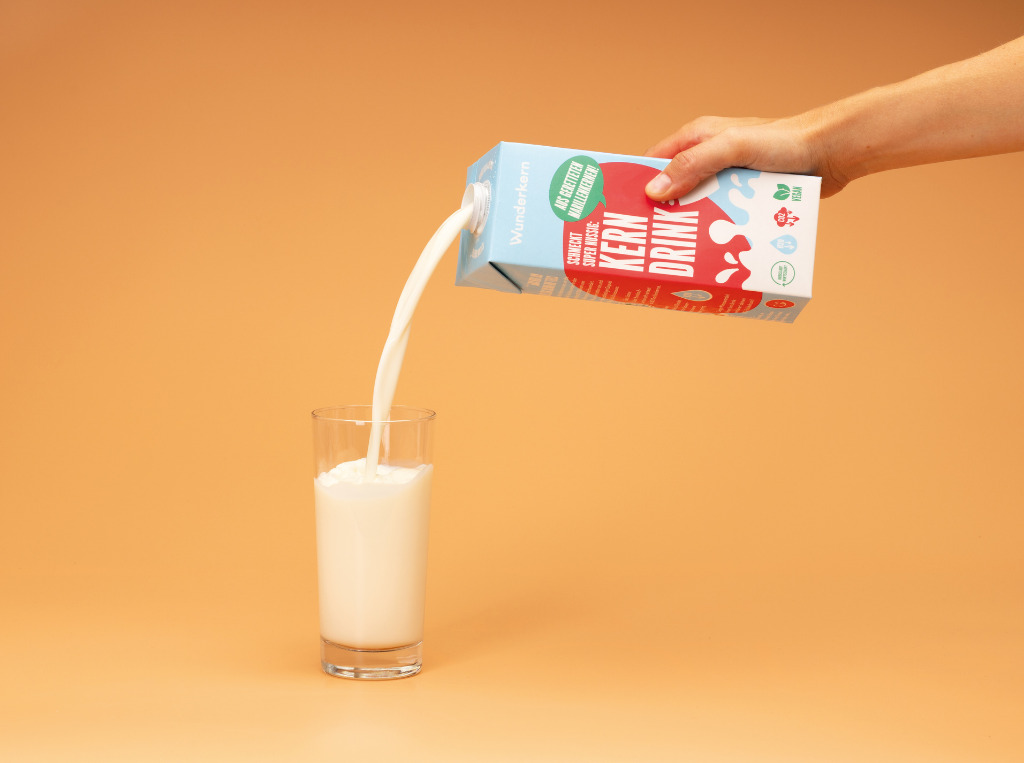Stone Fruit Kernel Milk: Austrian Startup Lands €12M Series A, Eyes US Launch in 2025
5 Mins Read
Austrian food tech startup Kern Tec, which upcycles stone fruit pits into plant-based dairy alternatives, has raised €12M in a Series A funding round. The brand’s co-founder Luca Fichtinger tells Green Queen that it aims to scale up European production and enter the US market in 2025.
Founded in 2019, Vienna-based Kern Tec uses pits of stone fruits like apricots, plums and cherries that are otherwise destined to go to waste and turns them into oil and ingredients for plant-based dairy products.
Last year, it unveiled its consumer-facing brand Wunderkern with a dairy-free ice cream made from apricot kernel oil (which it sells too). Since then, the lineup has expanded to include cherry and plum seed oils, as well as apricot-kernel-based milk and chocolate spread. And earlier this year, it showcased its apricot kernel dairy products at Germany’s BioFach European organic food fair.
Now, Kern Tec, which raised over €630K in a previous funding round, aims to use its Series A injunction to scale up production and commercialise its ingredients for both B2B and B2C applications. The investment round was led by Belgium’s Telos Impact, with additional participants including the PeakBridge Growth II Fund and the European Innovation Council (EIC) Fund. Apart from the equity financing, the company has “secured significant local and international grants”.

“Innovations in food ingredients, like those propelled by Kern Tec, play a pivotal role in transforming the food industry towards healthier and more sustainable products, at affordable costs,” said Peakbridge co-founder and general manager Erich Sieber. “Kern Tec’s initiatives pave the way for responsible production and consumption, while also offering enhanced flavour possibilities.”
Svetoslava Georgieva, chair of the EIC Fund Board, added: “Our investment will provide Kern Tec with the means to scale their business in Europe and, thanks to their innovative technology, contribute to saving resources and supporting farmers and businesses.”
A circular food system and safe processing process
Kern Tec was co-founded in Vienna by Fichtinger, Sebastian Jeschko, Fabian Wagesreither and Michael Beitl. Fichtinger tells Green Queen that apart from amping up its production capacity, the company wants to develop new technologies with the funds as well. Additionally, it hopes to scale the value chain and increase its employee numbers, “doubling down on product development for dairy alternatives and new categories”.
Fichtinger says Kern Tec has always focused on B2B, and uses its consumer brand to “bring products to the market early, collect valuable feedback and improve recipes”. “We have started a collaboration with a notable German dairy company, which will come to market very soon,” he reveals. “Additionally, we have created a product line in the snack category with the Swiss retailer Coop, and have placed our [Wunderkern] dairy alternatives on the shelves of Rewe in Austria.”
The company says 500,000 tonnes of stone fruit pits go to landfill each year in Europe. Its products valorise the sidestream and upcycled usually discarded ingredients, contributing to a circular food system. “We typically buy the products, as we need them to be treated as food products – not as waste. This is how we motivate our suppliers to take care of the raw materials,” he adds.
But stone fruit pits, including those of apricots, cherries and plums, can contain amygdalin, a cyanide compound. The poison can be fatal when processed into powder or crushed – poorly processed apricot kernel oil could contain traces of the substance.
This is why Kern Tec has created a breakthrough process for the safe treatment of cyanide. “We have developed a process to reduce the cyanide content in goods, and therefore are able to bring fruit seed products to the market for the first time,” says Fichtinger. “After our processing, there is no risk of poisoning. We have aligned with all EU regulations, so consumption is harmless.”
The company’s oils and ingredients can be used for a variety of products – but it plans to stick to alt-dairy for now. “As our seeds (and so the formulations) are very similar to nuts – containing healthy fats and proteins – we can provide a complete ready-to-use compound, creating a new dairy alternative to the market,” Fichtinger explains. “We can therefore offer a new addition to the category of milk alternatives. Oat milk, almond milk, fruit seed milk.”
“There is such a great fit between the raw material in terms of taste, sustainability and nutrition,” he says on the decision to focus on plant-based dairy. “We [are] currently developing more and more products in this segment, such as vegan cheese, yoghurts and many more, which will enter the market very soon.”
Moreover, Fichtinger confirms the company plans to launch in the US in 2025, once it has successfully completed the scale-up process in Europe.

Sustainable fats and Austria’s plant-based industry
According to the alt-protein think tank the Good Food Institute Europe, Austria’s vegan retail market is “one of the smallest in Europe”. But consumer demand is growing rapidly, with plant-based food sales increasing by 22% between 2020-22. And alt-milk is the most developed category, with sales rising by 18% to reach €49.6M in 2022.
Meanwhile, unit sales of plant-based milk, meat and yoghurt outpaced their conventional counterparts in Austria last year. Cow’s milk saw unit sales decrease by 10% between 2022-22, whereas alt-milk witnessed an 18% hike in unit sales.
A 2021 survey by Smart Protein EU – albeit with a small sample size of 757 – has found that 35% of Austrians consider themselves flexitarians, with milk, cheese and yoghurt being the most frequently consumed dairy products. In terms of vegan food, alt-milk (21%) and yoghurt (15%) are consumed at least once a week by Austrians – the most of any other plant-based products. So while dairy is big in Austria, recent trends show potential for products like Kern Tec’s.

Kern Tec is part of a growing roster of startups in the sustainable fat sector. Californian startup Zero Acre makes cultivated oil using rain-fed sugarcane, and recently announced a pilot with hamburger chain Shake Shack. San Francisco-based Lypid has created a proprietary PhytoFat for plant-based meat, while Sweden’s Mycorena makes fermented fungi-based fat to replace animal fats.
Barcelona’s Cubiq Foods is developing omega-3 fats for alt-protein, Hong Kong-based OmniFoods makes a vegan OmniNano fat to mimic the juiciness of conventional meat, and AI-led startup Shiru‘s OleoPro plant fat is geared at alt-protein applications.
Other companies are working on alternatives to palm oil, including Estonian startup Äio, UK-based Clean Food Group, New York’s C16 Biosciences, Dutch company NoPalm Ingredients, and Germany’s ChoViva.



